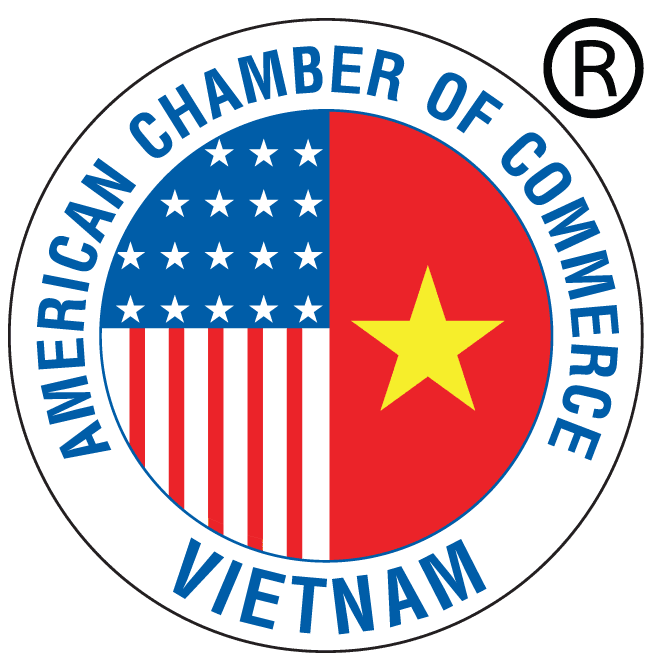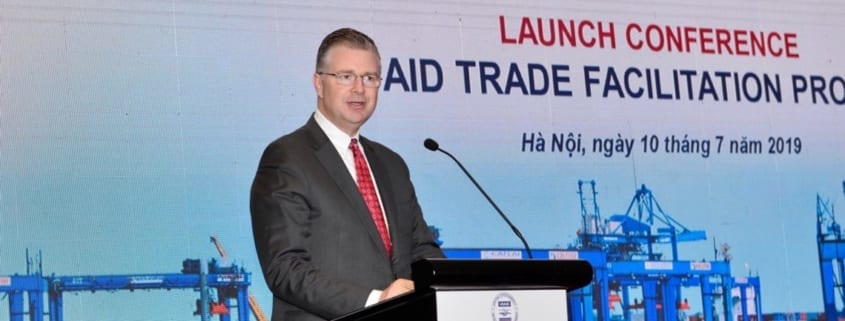Vietnam launches Trade Facilitation Agreement implementation program
TFA could reduce Vietnam’s trade costs by 20%, according to the World Trade Organization, more than any Free Trade Agreement tariff reductions.
HANOI, July 10, 2019 — Today, the United States Agency for International Development (USAID) and Vietnam’s Ministry of Finance launched the USAID Trade Facilitation Program. It was attended by Vietnam’s Deputy Prime Minister Vương Đình Huệ, Chairman of Vietnam’s National Committee on Trade Facilitation, U.S. Ambassador to Vietnam Daniel J. Kritenbrink, USAID/Vietnam Mission Director Michael Greene, as well as representatives from local government agencies, international organizations, and business associations.
The five-year, $21.7 million USAID Trade Facilitation Program aims to support the Government of Vietnam to adopt and implement a risk management approach to customs and specialized inspection agencies, which will strengthen the implementation of the World Trade Organization’s Trade Facilitation Agreement of which both Vietnam and the United States are members. 
The USAID Trade Facilitation Program will work with the General Department of Vietnam Customs (GDVC), under the Ministry of Finance, to strengthen the role and capacity of Vietnam’s National Trade Facilitation Committee (NTFC) and their associated working groups to improve the efficiency of specialized inspections and customs-to-business partnerships.
The USAID Trade Facilitation Program will be implemented until 2023 and will support the standardization of policies and procedures for export and import, strengthen national and provincial coordination, and build the capacity of provincial customs officers. This will help Vietnam develop a more attractive and predictable trade and investment climate for domestic small and medium-sized enterprises as well as international traders and investors.
For more information on the USAID Trade Facilitation Program, visit here.
Background Information from five years of AmCham effort on trade facilitation (Dec 2013 – Dec 2018):
1 Trade Facilitation Agreement in the “Bali Package,” Dec 2013
“The trade facilitation agreement is a multilateral deal to simplify customs procedures by reducing costs and improving their speed and efficiency. It will be a legally binding agreement and is one of the biggest reforms of the WTO since its establishment in 1995. The objectives are: to speed up customs procedures; make trade easier, faster and cheaper; provide clarity, efficiency and transparency; reduce bureaucracy and corruption, and use technological advances..
“Part of the deal involves assistance for developing and least developed countries to update their infrastructure, train customs officials, or for any other cost associated with implementing the agreement.”
2 U.S-backed Alliance to Facilitate Trade through Public-Private Dialogue VTFA, Dec 2014
Signing ceremony of MOU between USAID-VCCI-AmCham to launch Vietnam Trade Facilitation Alliance (VTFA)
“For Viet Nam, the Trade Facilitation Agreement could reduce trade costs by as much as 20%. Cutting a fifth off the cost of trading would make a huge difference. It will help to boost trade flows in Viet Nam. It will support SMEs to start exporting. And, in a time when production chains have been globalised, it will help the economy to connect to cross-border production networks.”
4. USAID/CBP TFA Technical Assistance Mission to Vietnam, Mar 2016
Key TFA implementation strategy presented by Virginia Brown, Director, USAID Office of Trade and Regulatory Reform and Maria Luisa Boyce, Senior Advisor to the CBP Commissioner for Trade and Private Sector Engagement, during their Mar 2016 mission to Vietnam.
A Comprehensive Approach to Trade Facilitation and Capacity Building: Connecting Developing Countries to Global Supply Chains
Cách tiếp cận toàn diện để tạo thuận lợi thương mại và nâng cao năng lực: Kết nối các nước đang phát triển với chuỗi cung ứng toàn cầu
5. Technical Assistance Mission by CBP Senior Officials, led by Deputy Commissioner, Jul 2016
During his Jul 28-29, 2016 visit to HCMC and Hanoi, Deputy CBP Commissioner Kevin McAleenan emphasized that three pre-requisites for implementing the WTO Trade Facilitation Agreement, needed to establish the institutional framework, include: (1) National Committee on Trade Facilitation, (2) Customs Cooperation (Customs Mutual Assistance Agreement), and (3) Government – Business Consultations on all laws and regulations affecting imports and exports.
6 VTFA Project Phase 1 (Apr 2015 – Aug 2016) Completion Report, Sep 2016
AmCham’s report on the activities, lessons learned, recommendations from VTFA Project Phase 1. “The Jul 28-29, 2016 Mission of CBP Senior Leaders and Business Advisors resulted in a CBP – GDVC “foundation agreement” on intelligence and information sharing, as a first step toward a full Customs Mutual Assistance Agreement (CMAA), which was agreed on as a goal to move towards.”
7 VTFA Project Phase 2 ( May 2017 – May 2018 ) Completion Report, May 2018
AmCham’s report on the activities, lessons learned, recommendations from VTFA Project Phase 2. “At a meeting in HCMC in 2018 with USAID Senior Advisor Ana Guevara and USAID International Trade Specialist Eleanor Thornton, an AmCham company logistics and supply chain manager said that GDVC standardization and simplification of the goods declaration and supporting documents had resulted in cost savings of $800,000/year for her company.”
8 AmCham Recommendations to USAID/Nathan Assoc. Mar 2018 on Trade Facilitation Program, 2018 – 2023
AmCham submitted 15 pages of detailed background information and recommendations for the USAID TFP, provided to Nathan and other bidders on the project. Nathan is following key elements of the recommendations..
9 Vietnam Notifies WTO of A,B,C Commitments, Nov 2018
“Vietnam’s ‘B and C categories’ list was supposed to have been transmitted to the Vietnam delegation to the WTO by Official Letter 175/BCDLNHNKT, 28/5/2018 ( see copy at below link, provided by GIG/Chemonics/Ms. Phuong Vu ), but it seems that the list was not attached to the cover letter sent to Vietnam’s Mission to the WTO, or the list got lost in Geneva.
AmCham contacted the GDVC International Cooperation Dept. several times to ask them to check into this and, if necessary, send the list of B and C commitments again to the Phái đoàn đại diện Việt Nam bên cạnh Liên hợp quốc, WTO, và các tổ chức quốc tế ở Genève (Phòng WTO)”
Within a few weeks of AmCham’s Oct 25, 2018 email, Vietnam’s B & C notifications appeared on the WTO web site on Nov 16, 2018. Click the link at item 9 above.
10 WCO (World Customs Organization) On-Line Training for Vietnam Customs Officials, Apr 25, 2019
AmCham recommended in item 8 above, see pages 7, 8 and 9.
11 TFP National Committee on Trade Facilitation Launch Ceremony, July 10, 2019
AmCham recommended in item 8 above, page 10 “Help broker deeper private sector participation in the NCTF. The NCTF is a governmental inter-agency group, like the U.S. Border Inter-Agency Executive Council (BIEC), so private sector membership is not appropriate, although VCCI is a member to represent the private sector. RE participation, VTFA plans to work with VCCI and HCMC Customs Dept, in coordination with GDVC, the “Standing Body” of the NCTF, to organize two annual NCTF meetings (October and April) with private sector participants, along the lines of the U.S. CBP “Trade Symposiums” for key senior officials to explain highlights of GDVC key programs and upcoming plans and projects.”
Examples: Agenda for Aug 14-15, 2018 U.S. CBP Trade Symposiusm, Announcement for Jul 23-24, 20199 U.S. CBP Trade Symposium
12. Technical Assistance on Advance Rulings, Authorized Economic Operators
AmCham recommended in item 6 above, page 4 “… it would be good to review the Category A commitments to see if Vietnam’s regulations are in compliance with the WTO TFA, and, if not, to revise regulations to come into compliance. .”
And AmCham signed an MOU with VCCI to cooperate with VCCI-HCMC and HCMC Customs on Advance Rulings
“VCCI-HCM and AMCHAM pledged to strengthen cooperation with Vietnamese and the U.S. authorities in sharing information to warn and prevent trade frauds about origin and illegal transshipment.
“Advance Rulings and other consultancy activities
“Advance Ruling in accordance with US law includes predetermination of codes, origins, trademarks and customs values (collectively known as Advance rulings). The two parties agree that AMCHAM is responsible for timely disclosure of the United States’ advance rulings and that the two parties have the responsibility to post this information on their websites for reference.
“The two parties agree that VCCI-HCM is the focal point for receiving consultancy requests for Advance Rulings and other consultancy requirements of enterprises. VCCI-HCM directly advises or through experts who may be members of AMCHAM and the U.S. experts for complex consultancy requirements.”
13. Technical Assistance to establish a modern customs bond system in Vietnam.
TFA Article 7.3 provides for “Separation of Release from Final Determination of Customs Duties, Taxes, Fees and Charges.” AmCham member Nestor Scherbey, President, CTRMS Vietnam, has worked with the Office of Government and GDVC to establish a current customs bond pilot program of Vietnam Customs to facilitate imports and exports and fulfill requirements of the WTO Trade Facilitation Agreement. Click the link at item 13 above for an explanation of a modern customs bond system. To participate in the on-going customs bond pilot program, pls contact
Nestor Scherbey | President
CTRMS Viet Nam
M/F, 139 Pasteur, Phường 6, Quận 3, Tp. Hồ Chí Minh,
Viet Nam
(M) +84 (0)9 77722979
(E) [email protected]
www.ctrms.com
Skype: nestor.scherbey
or
TRAN VIET HUY ( M)
BOD member cum MD of TRA-SAS
34 Nguyen Thi Nghia street, District 1, Ho Chi Minh city, VN
Mobile/ whatsapp/viber: +84 903733173;
Desk phone:+ 84 28 39250222 ext 513; Skype: huy-tv
Email: [email protected]
Company profile: www.trasas.com.vn
14 More technical assistance for Vietnam Trade Facilitation planned in the future
“In 2016, The Senate Foreign Relations Committee approved legislation that would establish a five-year pilot program to help developing countries implement the WTO Trade Facilitation Agreement, which aims to cut red tape in customs and other international trade procedures. The legislation was sponsored by Chairman Bob Corker and ranking member Ben Cardin. Although the bill, S.2201 — 114th Congress (2015-2016), did not become law in the 114th Congress, its strong bi-partisan support indicates that it could be introduced again in a future Congress and approved in line with the Joint State-USAID Strategic Plan 2018-2022, and USAID’s Policy Framework as a mechanism to support Vietnam’s Journey to Self-Reliance.
“4) Trade Facilitation Pilot Program – The bill directs the Secretary of State, with the U.S. Trade Representative and U.S. Agency for International Development, to form a five-year pilot program to promote developing country implementation of the TFA and trade facilitation reforms, with an annual budget of $50 million 2016 – 2021. “Not fewer than five countries” are to receive capacity building assistance in the beginning of the program, and expanded to 15 countries by 2021. The TFA will help improve regulatory transparency and reform and streamline customs procedures in developing countries. The Organization for Economic Cooperation and Development (OECD) estimates that the TFA, if fully implemented, could reduce trade costs for low-income countries by as much as 14 percent and for middle to higher-income countries by as much as 13 – 15 percent. The OECD also found a global reduction in trade costs by only one percent would boost worldwide income by as much as $40 billion, well over half of which would go to developing countries.”



Leave a Reply
Want to join the discussion?Feel free to contribute!